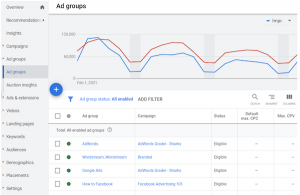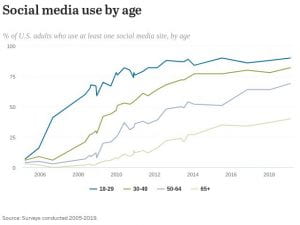
Thanks to social media, advertising to a broad range of people across physical and man-made borders has never been easier. Social media has transformed how people and businesses can interact throughout the world. In just a few moments a marketer can create a post advertising their product halfway across the world and almost everywhere in between. Not only that, but Susan, a charming cat lady in west London, can send her friend Linda, who’s visiting her son in Costa Rica an advertisement she saw for sunglasses she thinks Linda might like. The data collected by social media sites allows marketers to target specific groups of people with their advertisements. For example, if Susan was part of a few Facebook cat groups, she would undoubtedly receive more cat tower or toy related advertisements than the average person.

Advertising on social media also allows local stores or venues to advertise to the local communities, targeting groups of people in the local area. New jobs in this area are being created, young entrepreneurs are selling their social media skills to help small business owners create an online presence. Social media has also transformed the way stores advertise to people as well, no longer must stores rely on solely a posterboard, or scripted advertisement. Individuals with a large enough following on social media are sought out by companies to “review” or test their products for free.
Social media has transformed and expanded the marketplace exponentially. Who we can reach in the world, who we can market to and sell to has expanded beyond physical barriers. With these changes, and newfound capabilities through technology, comes a new legal frontier.
Today, most major brands and companies have their own social media account. Building a store’s “online presence” and promoting brand awareness has now become a priority for many marketing departments. According to Internet Advertising Revenue Report: Full Year 2019 Results & Q1 2020 Revenues, “The Interactive Advertising bureau, an industry trade association, and the research firm eMarketer estimate that U.S. social media advertising revenue was roughly $36 billion in 2019, making up approximately 30% of all digital advertising revenue,” they expect that it will increase to $43 billion in 2020.

The Pew Research Center estimated, “that in 2019, 72% of U.S. adults, or about 184 million U.S. adults, used at least one social media site, based on the results of a series of surveys.”

Companies and people are increasingly utilizing these tools, what are the legal implications?
This area of law is quickly growing. Advertisers can now directly reach their consumers in an instant, marketing their products at comparable prices. The FTC, Federal Trade Commission has expanded its enforcement actions in this area. Some examples of this are:
- The Securities and Exchange Commission Regulation Fair Disclosure addresses, “ the selective disclosure of information by publicly traded companies and other issuers, and the SEC has clarified that disseminating information through social media outlets like Facebook and Twitter is allowed so long as investors have been alerted about which social media will be used to disseminate such information,”
- The National Labor Relations Act, “While crafting an effective social media policy regarding who can post for a company or what is acceptable content to post relating to the company is important, companies need to ensure that the policy is not overly broad or can be interpreted as limiting employees’ rights related to protected concerted activity”
- FDA, “ Even on social media platforms, businesses running promotions or advertising online have to be careful not to run afoul of FDA disclosure requirements”
According to the ABA there are two basic principles in advertising law which apply to any media:
- Advertisers must have a reasonable basis to substantiate claims made; and
- If disclosure is required to prevent an ad from being misleading, such disclosure must appear in a clear and conspicuous manner.
Advertisements may be subject to more specific regulations regarding Children under the Children’s Online Privacy Protection Act (COPPA). This act gives parents control over protections and approvable ways to get verifiable parental consent.

The Future legality of our Data
Data brokers are companies that collect information about you and sell that data to other companies or individuals. This information can include everything from family birthdays, addresses, contacts, jobs, education, hobbies, interests, life events and health conditions. Currently, Data brokers are legal in most states. California and Vermont have enacted laws that require data brokers to register their operation in the state. Who owns your data? Should you? Should the sites you are creating the data on? Should it be free for companies to sell? Will states take this issue in different directions? If so, what would these implications be for companies and sites to keep up with?
Facebook’s market capitalization stands at $450 billion.
While there is uncertainty regarding this area of law, it is certain that it is new, expanding and will require much debate.
According to Custodians of the Internet: Platforms, Content Moderation, and the Hidden Decisions That Shape Social Media, “Collecting user data allows operators to offer different advertisements based on its potential relevance to different users.” The data collected by social media companies enables them to build complex strategies and sell advertising “space” targeting specific user groups to companies, organizations, and political campaigns (How Does Facebook Make Money). The capabilities here seem endless, “Social media operators place ad spaces in a marketplaces that runs an instantaneous auction with advertisers that can place automated bids.” With the ever expanding possibilities of social media comes a growing legal frontier.
Removing Content
Section 230, a provision of the 1996 Communications Decency Act, states that “No provider or user of an interactive computer service shall be treated as the publisher or speaker of any information provided by another information content provider” (47 U.S.C. § 230). This act shields social media companies from liability for content posted by their users and allows them to remove lawful but objectionable posts.

One legal issue that has been arising here is, advertisements are being taken down by the content monitoring algorithms. According to a Congressional Research Services report, during the COVID-19 pandemic social media companies relied more heavily on automated systems to monitor content. These systems could review large volumes of the content at a time however they mistakenly removed some content. “Facebook’s automated systems have reportedly removed ads from small businesses, mistakenly identifying them as content that violates its policies and causing the business to lose money during the appeals process” (Facebook’s AI Mistakenly Bans Ads for Struggling Businesses). This has affected a wide range of small businesses according to Facebook’s community standards transparency enforcement report. According to this same report, “In 2019, Facebook restored 23% of the 76 million appeals it received, and restored an additional 284 million pieces of content without an appeal—about 2% of the content that it took action on for violating its policies.”

